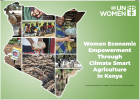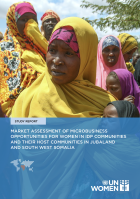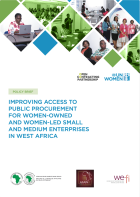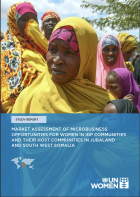1 - 14 of 14 Results
Date:
The transition to a low carbon economy is leading to important socioeconomic transformation in sub-Saharan Africa. The green transition can help governments align their development strategies. Gender equality and women’s and youth employment are critical priorities. This toolkit helps stakeholders involved in the process of formulation or revision of climate change and green policies (i.e. NDCs or NAPs) to identify opportunities to maximize co-benefits of gender equality and climate action.
Date:
The WEE-CSA Storybook showcases the success stories of over 2,400 women from Kitui, Laikipia, and West Pokot who have transformed their lives through climate-smart agriculture. Funded by KOICA and implemented by UN Women Kenya, it highlights the project's impact on livelihoods and gender equality while sharing valuable lessons learned. This collection celebrates resilience and aims to inspire further community upliftment for sustainable development in Kenya.
Date:
Empowering women, building resilience: A UN Women and FAO Kenya project tackles climate challenges in arid regions. The initiative equips them with climate-smart agriculture skills, boosting incomes, nutrition, and their voice in agricultural policies. This collaborative effort fosters a future where women are key players in building sustainable livelihoods that thrive despite climate change.
Date:
The publication aims to understand the current landscape of microbusiness in terms of the opportunities, barriers and challenges that women in displacement settings face in accessing economic opportunities in the cities of Kismayo, Dollow and Baidoa
Date:
Women own 30 per cent of the small and medium businesses worldwide, yet women-owned businesses only access 1 per cent of all procurement contracts suggesting systemic gender disparities within procurement systems. This policy brief analyses the extent to and ways in which regional institutions in West Africa could adopt better policies for gender-responsive procurement.
Date:
Despite robust legislation through Kenya’s Constitution, and improved results in the 2022 election, the number of female politicians remains low. Kenya remains one of the lowest ranking countries in the region when it comes to women’s participation in politics. The study investigates the factors that inhibit women candidates from vying and obstacles that exist once elected. In particular, the study brings into perspective how barriers to women’s political life are evolving, from violence shifting to more brutal online attacks, sexual harassment within political party ranks, and the disproportionate cost of running for office for women candidates.
Date:
This quarterly newsletter profiles UN Women Uganda activities and highlights voices of beneficiaries. The Q3 Newsletter covers the period of July to September 2022.
Enjoy the read!
Date:
This policy brief highlights the main findings of four academic research papers on the Women, Peace and Security (WPS) agenda that were presented during a workshop organized by UN Women Ethiopia Country Office in December 2021.
The findings focus on protection of women from conflict-related sexual violence; gender-sensitive recovery programs; role of women human rights defenderds in supporting the WPS agenda; and awareness of Members of Parliament on the agenda.
Date:
The policy brief aims to serve as an synthesizes and presents key findings from UN Women-led research; regional online surveys and; advocacy on. making the AfCFTA work for (young) women and (young) women-led businesses, both in the design and implementation of gender-responsive AfCFTA policy reforms and complementary measures, as well as in the soon-to-be negotiated AfCFTA Protocol on Women and Youth in Trade.
Date:
Empowering women in the economy and closing gender gaps in the workspace is key to achieving the 2030 Agenda for Sustainable Development and achieving the Sustainable Development Goals in Somalia. The host community landowners and IDP casual laborers can jointly build their skills in climate-smart agriculture that can benefit the productivity of farms whilst also building the knowledge and skill set of IDPs.
Date:
The African Continental Free Trade Area (AfCFTA) an opportunity for growth and prosperity in Africa. However, because of pre-existing inequalities in African economies, the agreement’s benefits will not be distributed equally along gender lines. As the AfCFTA Secretariat is starting to draft a Women in Trade Protocol, it is important that women across the continent participate actively in the process to voice their views, interests, and needs. This advocacy brief highlights 9 important...
Date:
The rapid assessment publication on Gender and Agricultural Mechanization in Ethiopia provides clear recommendations to inform the agricultural mechanization policy currently under development in the country by adding value to the process through introduction of gender responsiveness approach. The assessment also aims to strengthen enforcement of the existing agricultural mechanization by evaluating current practices in gender and mechanization in the...
Date:
UN Women East and Southern Africa continues to STEP IT UP for gender equality on a daily basis to give voice to women and girls who are still challenged with the violence, injustice, unequal opportunities and prejudices because of their gender.
Date:
In this issue : -Introduction: the gender gap in agricultural productivity -Three takeaways on the gender gap in agricultural productivity -Measuring the cost of the gender gap in agricultural productivity -Costing the factors that contribute to the gender gap in agricultural productivity -Finding the biggest bang for the buck: cost-effective policy interventions -Moving from recommendations to implementation -Appendix A: Methodology for quantifying the cost of the gender gap in...












